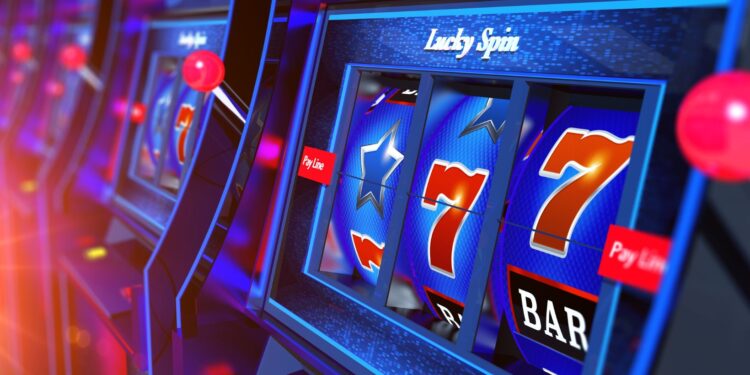A casino is a place where gambling is brought together to create a unique atmosphere of excitement and winning opportunities. For many people, a visit to a casino is a form of entertainment, a way to relax, or even a chance to win big. This article will help you learn what does volatility mean in slots.
What is Casino Volatility?
Casino volatility is a characteristic of a game that describes the frequency and size of wins or losses that can occur during the game. In other words, volatility indicates the level of risk associated with a particular game or slot machine. It determines how often and in what amounts winnings will be paid out and how much the game results will fluctuate. The higher the volatility, the bigger both wins and losses can be, and low volatility means more stability with a lower frequency of large wins.
Volatility has a direct impact on how often a player can expect to win. In games with high volatility, winnings are less frequent but much larger. Therefore, players looking for a chance to win a large jackpot often choose machines with high volatility. In contrast, low-volatility games have more frequent wins, but they are usually much smaller. The choice between games with high or low volatility depends on what a player is looking for: more small wins or rare but large prizes.
Types of Volatility in Slot Machines
- Games with high volatility can have big wins, but they don’t come around that often. This means that players can play for a long time without significant winnings, but when a win finally occurs, it can be very large. High volatility is suitable for those who are willing to endure long periods of losing for the chance of a big jackpot.
- Games with medium volatility offer a balance between the frequency of wins and their size. Wins happen quite often, but they are not as big as in the case of high volatility. This is an ideal choice for players who want to get fairly consistent wins without taking too much risk.
- Low volatility games have a high frequency of wins, but they are usually small. Such games can be attractive to those who don’t want to take too much risk and prefer a steady but small stream of winnings. It is a good choice for players who want a more stable experience without big jumps in results.
Understanding volatility is an important element when choosing slot machines and a casino strategy. It allows you to determine what type of games and winnings are right for a player, depending on their risk appetite and desire to win.
Variance in Casinos
Variance is a statistical indicator that measures the variability of game results, the deviation of wins or losses from the average. It is closely related to volatility, as both of them describe the risk and unpredictability of results. However, variance focuses on measuring deviations from the average win, while volatility covers the overall level of fluctuations.
Variance is a part of volatility and affects the size and frequency of wins. High variance means larger fluctuations in winnings, which can be rare but significant, while low variance provides stable but smaller winnings.
Variance determines how a player’s bankroll changes. Games with high variance can cause large fluctuations in balance, with periods of losing to large wins, requiring stamina and strategic planning. Games with low variance provide more stable wins, but they will be smaller.
RTP (Return to Player)
RTP (Return to Player) is the percentage of bets that is returned to the player in the form of winnings over time. For example, a slot machine with an RTP of 95% means that for every 100 units of betting, a player can get 95 units of winnings on average, and the remaining 5% is the casino’s advantage. RTP works on a large number of bets and does not guarantee an exact result for each player.
The higher the RTP, the greater the chances of a return in the long run. Games with a high RTP (98% or more) offer more chances to win, although each player may receive more or less than this figure in the short term. Games with a low RTP (85-90%) offer fewer chances to win and increase the casino’s advantage. RTP is useful for comparing games, but it doesn’t take into account factors such as bonuses or jackpots that can change the outcome of a game.
Casino Odds and Chances
In casinos, the odds of winning depend on the probability of an event occurring during a game and can be represented by odds. The odds indicate how many times you can win a certain amount compared to the amount you bet.
Casino winning odds are calculated based on probabilities that determine how often a certain event can occur in a game. For example:
- In roulette, the odds of winning will depend on the number of possible outcomes. If you play on a single number in European roulette, the odds of winning are 1 in 37 (one chance in 37 possible outcomes). In American roulette, the odds are reduced to 1 in 38 due to the presence of two zeros.
- In Blackjack, the odds depend on the cards remaining in the deck and the probability that the player and the dealer will receive certain cards.
The odds can be calculated using probability, for example, for an event that has several possible outcomes (such as winning on one of the numbers in roulette), the odds are defined as the number of winning outcomes divided by the total number of possible outcomes. Types of odds:
- Single odds.
This is the simplest type of odds, which indicates the probability of a certain event occurring. For example, in sports betting, odds of 2.00 mean that for every 1 unit bet, a player can receive 2 units in case of a win. In casinos, single-digit odds can be applied to bets on simple events, such as red or black in roulette.

- Combined odds
Combined odds occur when multiple events or conditions are added to a single bet. This can be a bet on several outcomes in one round of a game, for example, a bet on several roulette numbers at the same time. In this case, the odds for each event are multiplied by each other. For example, if a player bets on two numbers, and each of them has odds of 35:1, the combined odds will be 35 × 35 = 1225:1.
- Compound odds
Compound odds take into account more variables and are used for more complex bets. They can be applied to bets where there are several possible outcomes with different probabilities, such as in poker or blackjack, where the cards in your hand and the probability of a particular card coming up are taken into account.
The higher the coefficient, the lower the probability of winning, but the higher the potential winnings. At the same time, low odds indicate a high probability of winning, but also a smaller amount of money. Understanding these odds helps players to better assess risks and choose casino strategies.









